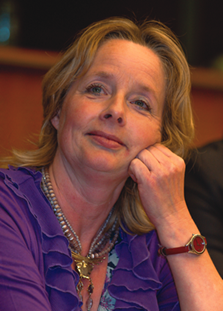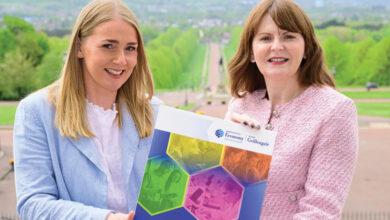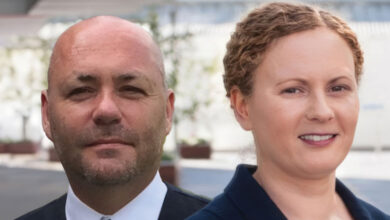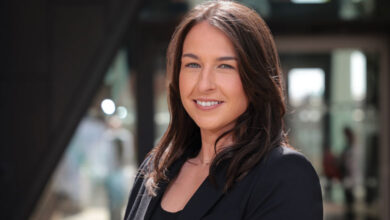Nessa Childers interview: Responsible role
 A relatively new MEP, Nessa Childers speaks to Meadhbh Monahan about her wide remit in Brussels and how decisions made now will affect future generations.
A relatively new MEP, Nessa Childers speaks to Meadhbh Monahan about her wide remit in Brussels and how decisions made now will affect future generations.
In a committee that deals with a broad range of topics, Nessa Childers acknowledges that “if you focus on everything there would be no time.”
The Environment, Public Health and Food Safety Committee is one of the largest committees in the European Parliament with 64 full members and 63 substitute members.
A daughter of former Irish President Erskine Hamilton Childers and grand- daughter of Robert Erskine Childers, who was executed during the Irish Civil war, she is a psychotherapist by profession.
She notes that her move into politics was influenced by her father who was “very keen on the EU project at a time when not everybody necessarily was.” Indeed, Childers reveals that her father was once in line to be an EU Commissioner because he had lived in Paris for a time, and had a European perspective.
A member of the Irish Labour party, she was elected in June 2009 with 78,338 first preference votes and represents Ireland East which stretches from Offaly to Wexford. As well as being a full member of the Environment Committee, she is a substitute member of the Culture and Education Committee. She was one of the 50 newly elected MEPs.
“It has been very busy, very active and very interesting,” Childers remarks of her first year as an MEP.
“Everything has been in a state of flux since Lisbon.”
Climate change
Childers is particularly interested in climate change. Following what she described as the “calamitous” Copenhagen talks in December, she welcomed the appointment of a dedicated EU Climate Change Commissioner.
A move to a 30 per cent emissions cut target is affordable now because of the economic downturn, in her view.
“I think it’s particularly realistic in that carbon numbers are going down and it is an opportunity to deal with climate change and our dependence on fossil fuels,” Childers contends.
Childers agrees with a report by the Commission which highlights the potential benefits of moving to a 30 per cent reduction as being a +0.6 per cent GDP growth, improved energy security through less oil and gas imports, and health benefits.
She has criticised the European emissions trading system as a “great disappointment” saying that the carbon price is too low and many large companies have made huge windfall profits from it.
On energy, Childers believes that “it is time to make sure that things are diverted into sustainable energy” which will create new jobs.
Nuclear energy, she states, should not be included in the energy chain until the situation becomes “severe.”
“We [already] import energy from nuclear sources,” Childers points out. “But we don’t need a nuclear power plant on the island of Ireland.”
Despite her opposition to nuclear energy, she realises that Ireland is “at the end of the energy chain” and sees a future, in 20 years’ time, when energy supplies start to run out, where nuclear energy will be debated as a viable option.
Well-being
Health policy is set by member states and is not normally high on the EU agenda. However, she finds that health is “getting more European and there are a lot of things you can do in the area of advocacy.”
Childers also works with public health umbrella bodies in Europe, many of which are owned by Irish companies. A member of the European Alzheimer’s Alliance, she has just released a shadow report on Alzheimer’s disease.
The safety of food and medicines is another item high on her agenda. The draft Food Information Directive is currently being debated in the Parliament with the aim of modernising, simplifying and clarifying food labelling within the European Union.
The Environment Committee succeeded in including a clause to ban the use of thrombin, an animal-derived additive used to ‘glue’ different pieces of meat together.
“The Commission wanted to re-label that as a food additive so that we couldn’t do anything with it but most parliamentarians felt that we didn’t need this stuff in the food-chain and I discovered that an awful lot of people including myself didn’t even know it was there,” Childers explains.
“I think we should have traffic lights on the front of food, particularly processed food, but not everyone would agree with me,” she adds.
MEPs are constantly being lobbied by businesses and other parties interested in various directives. For example, ASDA has met Childers three times in relation to food labelling.
Since the Lisbon Treaty was passed, Childers contends, MEPs have more power, meaning that the historical conflict between the European Council Ministers and the MEPs has intensified.
“It is predictable that would happen,” she says.
Childers emphasises that because Irish MEPs represent so many people they “can’t be powerless”, and adds: “That was one of the forces behind Lisbon, what is the point in MEPs being elected?”
Each Irish MEP represents approximately 250-300,000 constituents. With increased power, Childers claims, comes “responsibility and trouble.”
The only MEP representing the Republic in a committee of 127, Childers agrees that it “could be said to be too big” and feels that she carries a lot of responsibility.
Bairbre de Brún represents Northern Ireland and Childers believes: “It is quite a big thing to be the only two representing the island of Ireland.”
Parliamentary work can often get complicated with trialogues and quadrilogues (three or four-way informal discussions between the main EU institutions) occurring when there is deadlock over a particular piece of legislation before the formal conciliation committee begins.
“I have not had it happen yet because I am relatively new,” Childers notes. In addition, various ‘horizontal’ working groups work across committees. For example, the Energy Committee will often overlap with the work of the Environment Committee.
The North/South element of Childers’ work comes in many forms, such as; INTERREG funding, climate change, water safety, water charges and pet passports.
“We are the only two bits of Europe in existence who don’t have [water charges],” Childers states.
When Childers became aware that Ryan Air made passengers travelling from Ireland to the UK use passports, she queried this in Parliament and found that the passport free Common Travel Area “only barely exists in EU legislation.” It is mentioned in the 1999 Treaty of Amsterdam.
Childers states: “I find that very interesting from a sociological point of view. It’s not just worries about terrorism, it’s about how on earth would you deal with a border where you have to take out a passport half way across Ireland?”
She adds: “I am one of those people who actually believe that eventually we should be politicians without borders at all.
“I’m not talking about federalism. I just think that cultural differences are much more important than borders and what you find all across Europe is that cultures are separated by political borders.”
In 200 years, Childers believes these political borders will be done away with. She states that it is probably her family history which has led her to the conclusion that the nation-state is “an absolute disaster area” because it has “caused so much death and violence.”
In the surroundings of the European Parliament, Childers concludes, it is important to note, that “culture is different from states.”





